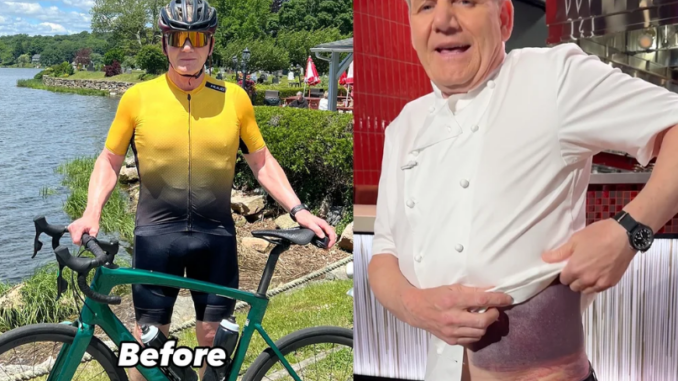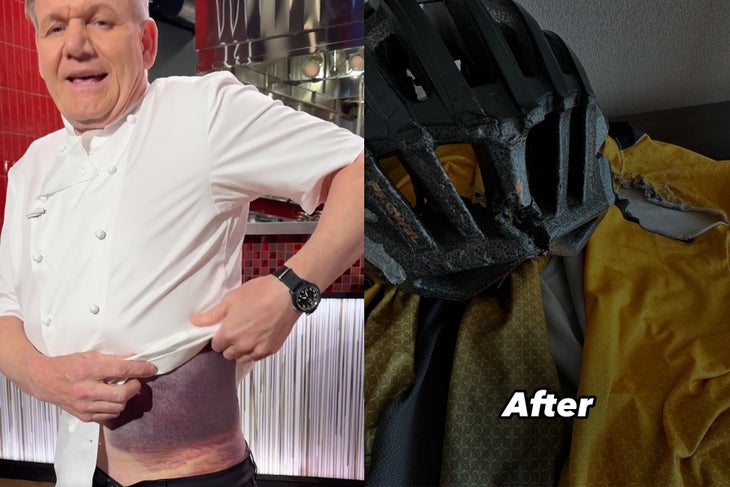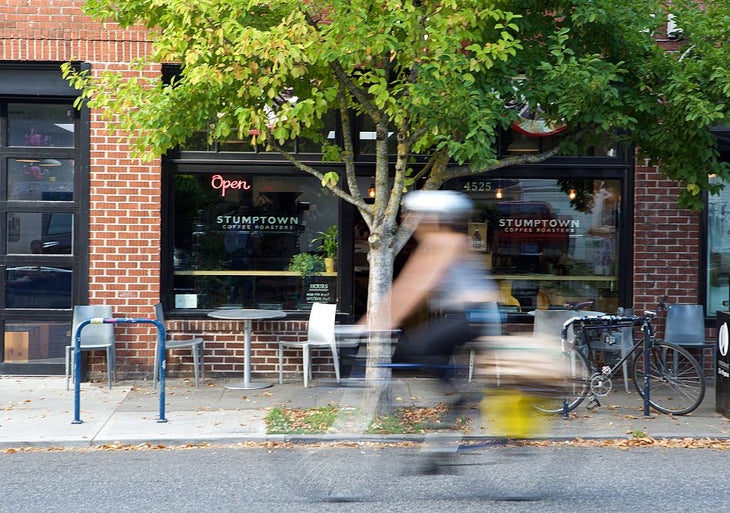
Why people are mad about the suggestion of wearing a helmet, and a look at whether that anger makes any sense.
You know Gordon Ramsay for his on-screen exploits, the abundance of expletives, and a seemingly endless number of new restaurants. But Ramsay is also an avid cyclist, and one who advocates for everyone to wear a helmet while riding their bikes.
In a recent Instagram post, he took a much more sober tone. After a seemingly serious accident during his bike ride involving a car, the overarching request was for cyclists to wear a helmet. Ramsay claims he was able to stand there after the accident thanks to his helmet, despite the battering that his torso and other parts of his body took.
The comments sections went wild. Some suggested that governments needed to mandate cyclist helmet laws. Others felt a helmet is inherently bad, some going so far as to say that they result in additional danger for cyclists. Wherever you went, everyone had an opinion.
Wait, is wearing a helmet all that controversial? Perhaps not to you. But to the internet at large? It’s caused a whole mess.
What happened to Gordon Ramsay?
The 57-year-old British celebrity chef and restaurateur found himself ending a recent bike ride in Connecticut with a crash. Ramsay shared the details of his crash in a recent Instagram post.
Here’s what he had to say:
“You know how much I love cycling and triathlons and Ironman. This week, unfortunately, I had a really bad accident and it really shook me,” he says in the video. “Honestly, I’m lucky to be here. Those incredible trauma surgeons, doctors, and nurses in the hospital who looked after me this week, they were amazing.
“But honestly, you’ve got to wear a helmet. I don’t care how short the journey is, I don’t care the fact that these helmets cost money, but they’re crucial. Even with the kids, a short journey, they’ve got to wear a helmet.
“Now I’m lucky to be standing here. I’m in pain, it’s been a brutal week. I’m sort of getting through but I cannot tell you the importance of wearing a helmet. This weekend is massive, for new fathers, old fathers, and middle-aged fathers, I want to wish you all a very happy Father’s day.
“But please, please please please, wear a helmet because if I didn’t, I wouldn’t be here now.”
It isn’t abundantly clear how the crash came to be, but the photos from his ride in Connecticut show a kitted-out green Specialized Roubaix road bike and an intact Ramsay. But the video and the ‘after’ photo show Ramsay’s shockingly bruised torso and a destroyed helmet.
Do helmets save lives? The data

Look around Amsterdam and you’d be hard-pressed to find someone riding a bicycle with a helmet on. Most folks don’t. Myriad reasons allow people riding bikes to get away with no helmet. The most obvious reason is that 27 percent of all trips in the Netherlands are done by bicycle, and the sheer presence of bikes on the road means drivers are more aware.
You’re likely to find data that says wearing a helmet makes riders seem less human to drivers. You’re also likely to find a study or two saying that a helmet-wearing cyclist might have a higher rate of falls than non-wearers. Time and again, vocal cyclists say that requiring a helmet while riding a bicycle actively dissuades folks from riding a bicycle rather than driving a car.
At the same time, however, a recent report from Dutch injury prevention group Veiligheid NL released a study saying that the number of seriously injured cyclists has risen 27 percent over the last decade. A study from the Dutch Institute for Road Safety Research estimated that there would be there would be 85 fewer people dead, and up to 2,600 fewer cyclists seriously injured annually if they wore a helmet.
The Netherlands has seemed to change its tune on helmets in recent years, at least slightly. The province of Utrecht offered its residents a €25 discount on the purchase of a new helmet. With that announcement came a quote (translated): “In the Netherlands, wearing a helmet on the bike is not mandatory, but wearing a bicycle helmet is recommended.”
These findings corroborate research from the National Highway Traffic Safety Administration (NHTSA), which found that helmet use reduced the likelihood of serious head injury by 60 percent. Sixty-three percent of people biking who died in a crash with a car were without a helmet. Whether or not you agree with the conclusion that helmet laws save lives, there is no denying that helmet usage only serves to help cyclists.
Beneficial as they might be, helmets should not be a crutch

The phrase “the helmet I worse saved my life” seems to bring out the worst in everyone. It results in basically two forms of discourse:
“You fool! Of course, you should never leave your house without a helmet! I’m surprised we’re not leaving the house without a reflective vest and pepper spray too!”
Or:
“You fool! Telling people to wear a helmet is only a bandaid on the major problem in our car-brained society!”
The truth of the matter falls somewhere between those two points and must be far more nuanced than those points require.
Every one of us makes errors of judgment on motorways. Perhaps a driver forgets to check a blind spot before switching lanes. A cyclist might roll through a crosswalk, narrowly avoiding a pedestrian entering the road. The issue is that we do not have a margin for error, particularly when drivers and people riding bikes must interact with one another.
Does a helmet provide a margin for error in these car-on-bike situations? Yes. Does it prevent you from being rammed by a car driver paying more attention to their phone than the road? Certainly not.
We cannot afford to act as if a helmet is a sole answer to dangerous public infrastructure and careless driving. The conversation cannot continue to be around what a cyclist must to do avoid being injured by a car, either. Both of those arguments bring us to where we are today, and they’ll continue to perpetuate a culture of blaming vulnerable communities for their injuries.
A helmet is not the answer to making our urban infrastructure safer.
I should also note that bike helmet laws in cities have been shelved in recent years. Requiring a helmet discourages people from riding a bike if they don’t have a helmet with them already. Studies have also proven that helmet requirement laws have been disproportionately enforced when they are in place, too.
But we also can’t act like a helmet does nothing. There’s simply too much data out there saying that a helmet can be the difference between life and death. And based on Gordon Ramsay’s words, a helmet can be seriously helpful.
It’s a similarly regressive argument for not wearing a seatbelt while being in a moving car. A helmet might require more effort than a seat belt (as you’re not always carrying around a helmet), but both offer slightly more margin for error than not using them at all.
I’m so glad that Ramsey isn’t more injured than he is. He attributes his ability to stand in front of the camera to his helmet, and I believe him. It just does nothing to counter his words with “Well, we shouldn’t need to wear a helmet in the first place.”